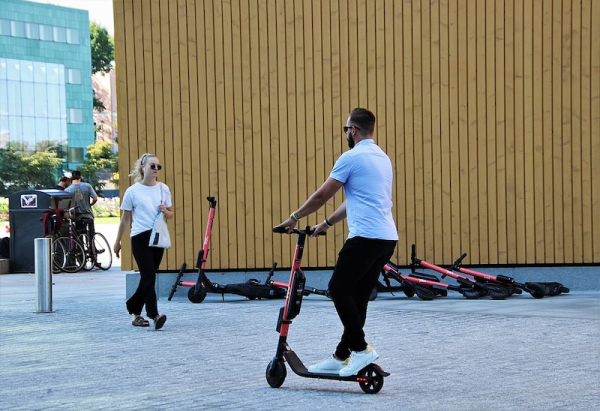
Man riding an e-scooter at Kansalaistori square in Helsinki city centre.
- Next Article Finland rejects US egg export request due to regulatory barriers
The Finnish government is moving forward with a legislative proposal that would give municipalities greater authority over electric scooters and other micromobility vehicles. The proposed micromobility licence would allow cities to set operating hours, speed limits, and parking rules for shared e-scooters and bikes.
The legislation is part of a broader effort to improve road safety, including a proposed 0.5 blood alcohol content (BAC) limit for riders of electric scooters and bicycles.
Traffic controllers would also be granted the authority to administer breathalyser tests to riders. The Ministry of Transport and Communications says these measures support Finland’s long-term goal of eliminating road traffic fatalities by 2050.
“The micromobility licence provides municipalities with an effective way of guiding services while considering local conditions,” said Sofia Johansson, Senior Specialist at the Ministry of Transport and Communications. She noted that the new regulations would allow cities to enforce measures such as geofencing and designated parking areas to reduce clutter and improve organisation.
The legislation aims to address safety concerns that have emerged with the rapid growth of micromobility services in Finland since 2019. E-scooter rentals, which have expanded rapidly, have led to increased traffic accidents and parking problems in major cities.
In a parallel effort, Transport Minister Lulu Ranne attended an EU transport ministers’ meeting in Warsaw this week, where she highlighted the importance of efficient infrastructure for both civilian and military transport. Ranne said Finland plays a key role in European mobility as it sits on the external border of both the EU and NATO. She stressed that EU funding should prioritise infrastructure improvements that enhance both security and transportation efficiency.
The Finnish government’s micromobility proposal was developed in response to findings from the country’s 2022–2026 Traffic Safety Strategy. The strategy identified challenges related to e-scooter parking and traffic accidents, prompting the Ministry of Transport to draft new regulations.
A government-appointed working group has been reviewing feedback from municipalities, industry stakeholders, and citizens. The legislation is set to be debated in Parliament before moving to committee review, with the changes expected to take effect in May 2025.
HT
- Next Article Finland rejects US egg export request due to regulatory barriers
Source: www.helsinkitimes.fi
